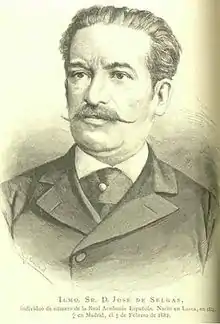José Selgas | |
|---|---|
 | |
| Born | José Selgas y Carrasco 27 November 1822 Lorca, Spain |
| Died | 5 February 1882 (aged 59) Madrid, Spain |
| Seat b of the Real Academia Española | |
| In office 1 March 1874 – 5 February 1882 | |
| Preceded by | Joaquín Francisco Pacheco |
| Succeeded by | Víctor Balaguer i Cirera |
José Selgas y Carrasco (born in Lorca, Murcia on November 27, 1822; dead in Madrid on February 5, 1882) was a Spanish poet, novelist and journalist.
Life
He received his early training at the Seminary of San Fulgencio; his family being in economically strained circumstances, he was obliged to cut short his studies in order to contribute to its support. Going to Madrid, he there occupied minor Government positions, and engaged in journalism.
As a staunch Conservative, he assailed the Liberals in the articles which he wrote for the periodical El Padre Cobos and other newspapers. He acted as secretary for Martinez Campos when the latter was Prime Minister. The Spanish Academy made him one of its members.[1]
Works
Selgas belongs among the minor writers. His repute depends upon his lyrics and his short tales rather than upon his more ambitious novels. The best of his verse, which is generally marked by a gentle melancholy, will be found in the two collections, "La Primavera" and "El Estio", both put forth in 1850. After his death there appeared the volume of poems entitled "Flores y Espinas". Of his longer novels there may be mentioned the "Dos Rivales" and "Una Madre", both rather tedious compositions. In his short tales he is most successful when he indulges in the sentimental; he is less attractive when he gives utterance to his pessimistic feeling. At times his sentimentalism and pessimism become even morbid.
A number of his journalistic articles have been brought together in several of the volumes of his collected works, as "Hojas sueltas", "Estudios sociales", etc. They illustrate his ultra-Conservativism in politics.
References
- ↑ "José de Selgas - letra b". Real Academia Española (in Spanish). Retrieved 27 May 2023.
- Obras completas, ed. Dubrull (15 vols., Madrid, 1887);
- Garcia, La Literatura espanola en el siglo XIX, pt. I, ii.
External links
- Catholic Encyclopedia article
- Works by José Selgas at Project Gutenberg
- Works by José Selgas at LibriVox (public domain audiobooks)

- Works by or about José Selgas at Internet Archive
![]() This article incorporates text from a publication now in the public domain: Herbermann, Charles, ed. (1913). Catholic Encyclopedia. New York: Robert Appleton Company.
This article incorporates text from a publication now in the public domain: Herbermann, Charles, ed. (1913). Catholic Encyclopedia. New York: Robert Appleton Company. {{cite encyclopedia}}: Missing or empty |title= (help)